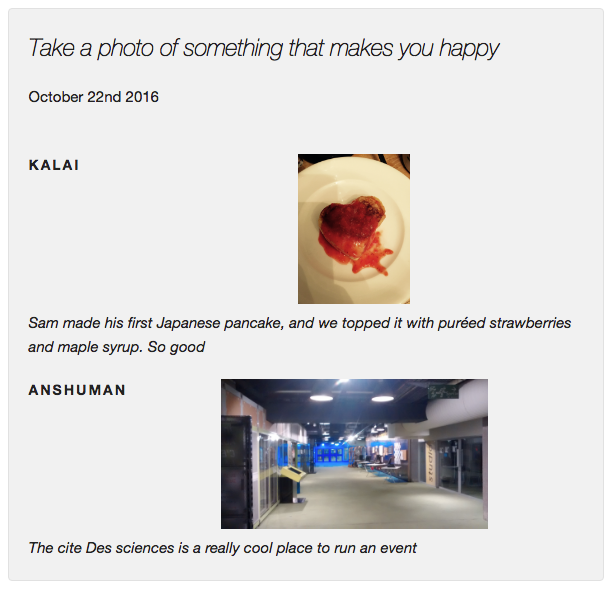
Same Day Different Lives prototype released
Written by Jesse Himmelstein, in cooperation with Gwen Ruelle from the Red String Project.
Try it online at sddl.crigamelab.org

What if we could meet people in reverse? That is, learn personal and intimate details about their experiences, thoughts, and day-to-day before we see the color of their skin, their gender, or their age?
Social psychology has shown that group stereotypes shape the way we think and feel about other people, even if we don’t consciously “want” it to be the case. When we see someone unfamiliar, we immediately categorize them by superficial criteria such as race, gender, looks, and age. And each of these categories correspond to expectations about the other person’s behavior and state of mind.
In the workplace, these biases are most apparent in decisions on hiring and promotions, and they are difficult to surmount. One way is to codify our social interactions, such as how Google HR now eschews free-form interviews. But what if we could re-wire our categorizations by simply meeting more diverse people and confronting our stereotypes with their realities?
This prototype, called Same Day Different Lives, takes that second approach. It is an online mobile game in which the player is assigned a pseudonym, and then is randomly paired up with someone else. At that point, the two contribute to a shared “journal” that only they can see and contribute to. To get the “conversation” started, they respond to a number of questions through taking pictures (like “Take a picture of something you’re throwing away today”) or recording their voice (like “Tell about a recent dream you had”).
After a number of days of such questions, they are then given a “quiz” in which they try to guess basic demographic information about the other person, such as their age and level of education. The intention here is to learn this superficial information only after first knowing them on a more personal level. On the final day, the two players are given a chance to chat freely, perhaps to ask each other about some of the experiences they shared that surprised them.
As an avid listener to podcasts, I appreciate the intimate nature of hearing someone talk about their personal experience. I was also inspired by the Rider Spoke project from Blast Theory and the Mixed Reality Lab at University of Nottingham, in which participants biked around the city, recording intimate stories from their past and listening to those of others, all anonymously.
This was also a chance to team up with Gwen Ruelle, who has worked on oral history as part the Red String Project and Oral History Productions. She and I designed and tested the prototype together, and she contributed most of the questions for the journal section.
In terms of development, this project was done completely in Clojure and ClojureScript, letting me develop my skills with those languages. I still can’t claim to be an expert, but I really appreciated its features to tame asynchronous operations.
Try it online at sddl.crigamelab.org
Source code available on GitHub: github.com/CyberCRI/same-day-different-lives



